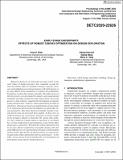Early-Stage Uncertainty: Effects of Robust Convex Optimization on Design Exploration
Author(s)
Pillai, Priya P; Burnell, Edward; Wang, Xiqing; Yang, Maria C
DownloadPublished version (1.233Mb)
Publisher Policy
Publisher Policy
Article is made available in accordance with the publisher's policy and may be subject to US copyright law. Please refer to the publisher's site for terms of use.
Terms of use
Metadata
Show full item recordAbstract
© 2020 American Society of Mechanical Engineers (ASME). All rights reserved. Engineers design for an inherently uncertain world. In the early stages of design processes, they commonly account for such uncertainty either by manually choosing a specific worstcase and multiplying uncertain parameters with safety factors or by using Monte Carlo simulations to estimate the probabilistic boundaries in which their design is feasible. The safety factors of this first practice are determined by industry and organizational standards, providing a limited account of uncertainty; the second practice is time intensive, requiring the development of separate testing infrastructure. In theory, robust optimization provides an alternative, allowing set based conceptualizations of uncertainty to be represented during model development as optimizable design parameters. How these theoretical benefits translate to design practice has not previously been studied. In this work, we analyzed present use of geometric programs as design models in the aerospace industry to determine the current state-of-theart, then conducted a human-subjects experiment to investigate how various mathematical representations of uncertainty affect design space exploration. We found that robust optimization led to far more efficient explorations of possible designs with only small differences in an experimental participant's understanding of their model. Specifically, the Pareto frontier of a typical participant using robust optimization left less performance "on the table" across various levels of risk than the very best frontiers of participants using industry-standard practices.
Date issued
2020Department
Massachusetts Institute of Technology. Department of Electrical Engineering and Computer Science; Massachusetts Institute of Technology. Department of Mechanical EngineeringJournal
Proceedings of the ASME Design Engineering Technical Conference
Publisher
ASME International
Citation
Pillai, Priya P, Burnell, Edward, Wang, Xiqing and Yang, Maria C. 2020. "Early-Stage Uncertainty: Effects of Robust Convex Optimization on Design Exploration." Proceedings of the ASME Design Engineering Technical Conference, 8.
Version: Final published version